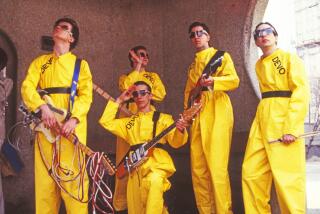‘Lambert & Stamp’ explores the ‘mesmerizing’ duo who managed the Who
- Share via
Kit Lambert and Chris Stamp were a class apart.
Lambert was a member of the aristocracy. His father was composer-conductor Constant Lambert. He was educated at Oxford and was fluent in several languages. He was gay but discreet because homosexuality was illegal in England in the 1960s.
Stamp was born dirt poor in London’s tough East End. The younger brother of actor Terence Stamp, he was so unabashedly interested in women that he once got a job backstage at the ballet as a way to meet them.
But despite their differences, the two bonded working as assistant film directors at Shepperton Studios. They loved French New Wave films, jazz and literature. And since they both wanted to become film directors, they hatched an idea of finding a fledgling rock group and documenting its journey to success.
“Lambert & Stamp,” a documentary from director James D. Cooper that opened Friday, chronicles the fascinating story of these business partners who took a rough-and-tumble group known as the High Numbers and, as its managers, helped transform Pete Townshend, Roger Daltrey, Keith Moon and John Entwistle into the legendary rock band the Who.
Along the way, Lambert and Stamp created a successful label, Track Records. They produced the Jimi Hendrix Experience. They lived like rock stars. But drugs, disagreements and money eventually got in the way. The Who fired them in the 1970s.
Lambert, who battled drug and alcohol addiction, died in 1981 at age 45 of a cerebral hemorrhage after a fall at his mother’s house.
Stamp had also dealt with substance abuse but, unlike Lambert, turned his life around and became a psychodrama therapist and addiction counselor.
Cooper, a cinematographer who makes his feature debut with “Lambert & Stamp,” describes the film as a love story. In fact, he noted, women who have attended screenings have told him that “this is probably the first and most brilliant examination of the vulnerabilities of men.”
When he pitched the idea to Stamp, whom he had known for several years, Cooper told him, “I don’t want to do a Who documentary. I want to do something about the emotional reality of this.”
When Stamp finally agreed to participate, he told Cooper, “If you are willing to put yourself through this, you will have my complete participation and availability.”
“Lambert & Stamp” features a treasure trove of archival footage from the era, a pulsating soundtrack and revealing interviews with Townshend, Daltrey and, most notably, the charismatic Stamp, who died of cancer in 2012 at age 70.
“In the last couple of years, you could see his health catching up with him,” said Cooper. “I knew he was having some issues, but he never brought that to the forefront. He entered into this process with me, and he wasn’t going to be the first to say, ‘It’s too much.’ He just kept showing up and showing up in a marvelous way.”
Because Lambert had been dead for almost 35 years, Cooper said it was challenging to make audiences feel his presence in the film.
“We were incredibly fortunate that both of these guys had been filmed to the degree they had,” said Cooper. “But just because you have footage of the person doesn’t necessarily mean you are presenting them in a character arc. We had to work very hard in the structure of the film to develop [Lambert’s] character and to keep his placement in the film.”
Though Lambert and Stamp had no experience in managing and no money when they met the group in 1964, Townshend and Daltrey told Cooper that they “had a kind of magic between the two of them that was irrefutable. They said it was something you can’t describe. The two of them together were mesmerizing, intoxicating and alluring.”
------------
For the Record
April 4, 12:14 p.m.: An earlier version of this story mentioned Cooper and Stamp as having no experience in managing when they met the members of the Who. It was Lambert and Stamp who managed the group.
------------
Twitter: @mymackie
More to Read
Only good movies
Get the Indie Focus newsletter, Mark Olsen's weekly guide to the world of cinema.
You may occasionally receive promotional content from the Los Angeles Times.











